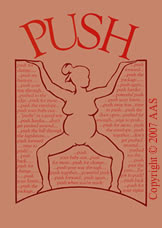By Heather
"We worry about what a child will be tomorrow, yet we forgot that he is someone today." - Stacia Tauscher
Let us remember that throughout pregnancy, labor, and delivery. I wish that this thought had been in the minds of those attending me during those times. More importantly, I wish I had known better than to give consent.
I had, overall, a textbook pregnancy and delivery--depending on what your opinion of 'textbook' and normalcy are in that area. To the doctors, I am sure it was quite routine. I had the regular symptoms of pregnancy and, like most women, was quite ready to be a mother by the time labor finally began.
My only true hinderance was morning sickness that persisted even into my third trimester. The CNM attending me, under the supervision of an ob/gyn, gave me a bottle of phenarghan. When that wore off, I was prescribed another drug. I quickly ran out of that, and she refused to prescribe anymore medication. Every month, she told me that it would fade away by the next visit.
By my second trimester, I had an extreme dislike of this woman for various reasons. She talked to me as though speaking to a child, with no knowledge of her body, who became accidently pregnant at a tender age and had no concept of adulthood whatsoever. She refused to help make my pregnancy or even my visits comfortable.
I was having such trouble sleeping that I all but begged her for something, anything, a prescription, a recommendation. She kept telling me to take Benadryll. If that had worked, I wouldn't have kept asking. Someone finally recommended melatonin, which was a blessing as I could at last get some rest without worrying about any side effects. I reported to the CNM that I had been taking it, and her response irks me to this day: "Oh yes, melatonin is totally safe!" (I don't know why she couldn't have mentioned that earlier.)
At my first visit, I was coerced into a pap smear. I told her that I didn't want one, that I couldn't have any STDs as I am and have always been monogamous, as has my husband who has tested STD-free at every physical since he enlisted. I was told I needed one anyway to check for cervical cancer, which I now know I couldn't possibly have had considering there was no way for me to have contracted HPV.
She insisted on quite a bit of bloodwork. Like a good little patient, I let them draw my blood. My eyes bulged as I noticed the six vials they intended to fill, but I remained obedient. I jokingly told the technician that I had a 'needle phobia.' By the second vial, I was feeling light-headed. By the third vial, I began asking the technician to stop. He kept telling me it was all in my head. As they filled the fourth vial, I went into convulsions and vomitted. I felt like I was going to fade away, as I uttered one final plea for them to stop.
As I sat recovering, sipping juice, the technician told me, again, it was all in my head. Another one came by, a rather intelligent fellow, and told me to make sure I had a nice big breakfast and plenty to drink before coming in to finish up tomorrow, so that I wouldn't become dehydrated and have low blood sugar issues after having my blood drawn. I am a small woman who cannot even donate blood because of my weight. I don't know why they felt it was okay to take 6 vials of it first thing in the morning.
I consented to all of the tests, even the gestational diabetes one which required me to starve myself and my child for half a day. I kept wondering how that could possibly be healthy.
Once I came into an appointment very sick and dehydrated with very low blood pressure. She sent me to have an IV put into my arm, along with some phenarghan to ease my nausea. I was very tired and hungry, and I wanted to sleep. I could not, however. The phenarghan made me restless. The fluids froze my arm and made me have to pee, almost every 5 minutes. The nurse assisting me thought I was going insane as I laid down, flopping around and jerkily moving about, using the toilet every 3 minutes, pacing the room, going out of my mind because of all of the mixed sensations. I asked her to remove it, and she would not for the longest time. Finally she asked if I truly felt better, and I lied so that I could go home.
How was it respectful to speak to me in such a condescending tone? How was it healthy to allow me to continue violently puking up everything I ingested throughout my entire pregnancy, then complain about my weight? How was it healthy to allow me to go without sleep, when she could have recommended melatonin? How was it respectful to coerce me into unneeded tests? How was it healthy to draw so much blood from a woman who barely weighed 110 lbs and hadn't been allowed to eat yet? How was it safe to force me not to eat for 12 hours? What benefits for my child could there have been? They paid no mind to the dangers of overloadng me with fluids or to the damage being done by my psyche, which inevitably affected my birth.
A birthing mother is a person. The child entering the world is a human being. They are both someone, not just patients and cases. They are intelligent people with vivid memories and complex minds. Doctors seem to forget this often, too worried about protecting their assets, their pocketbooks. Midwives and doulas try never to let this slip their minds and succeed much more frequently, being that they are typically paid the same no matter what the outcome
A mother who feels respected, encouraged, and empowered by her birth attendants, surrounded by positive energy, is much more likely to have a pleasant outcome, and that means birth and pregnancy are safer for her child. The best way to encourage the safety and well-being of a fetus is to treat the mother well who is carrying him within her womb.








No comments:
Post a Comment